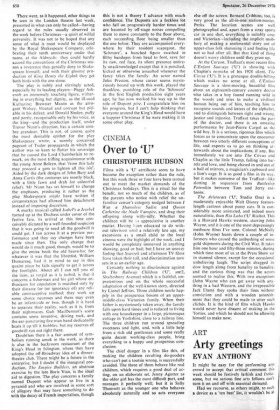CINEMA
Over to 119
CHRISTOPHER HUDSON
Films with a 'LI' certificate seem to have become the exception rather than the rule, but this week three or four have been trotted out to meet the market demands of the Christmas holidays. This is a ritual for the benefit, not so much of the children, as of the parents who notice with relief the un- familiar censor's category nudged between I Was a ,Shameless Sadist and Queen Catherine the Nude Vampire, and drag their offspring along willy-nilly. Whether the children will be :15 appreciative is another matter. Having been educated to do with- out television until a relatively late age, my excursions as a small child to the local cinema were the highlight of the week, and I would be completely immersed in anything showing, good or bad; but I have an uneasy feeling that Startrek and afternoon TV films have taken their toll, and discrimination now sets in at an earlier age.
Certainly nothing to discriminate against in The Railway Children (`U', aac2, Shaftesbury Avenue) which is a faithful, un- pretentious and on the whole successful adaptation of the well-known story, directed by Lionel Jeffries. Three children nestle hap- pily in the prosperous bosom of an upper- middle-class Victorian family. When their father is mysteriously taken away, the family falls upon hard times and is reduced to living with one housekeeper in a large, picturesque cottage in Yorkshire, close to a railway line. The three children run around spreading sweetness and light, and, with a little help from a rich old gentleman and some really quite decent working-class people, bring everything to a happy and prosperous con- clusion.
The chief danger in a film like this, of making the children revolting do-gooders who can't put a tootsie wrong, is successfully avoided. The three of them behave like real children, which requires a good deal of ac- ting, on an elaborate set. Jenny Agutter as the older girl has the most difficult part, and manages it perfectly well; but it is Sally Thomsett as the younger one who behaves absolutely naturally and so acts everyone else off the screen. Bernard Cribbins, too, is very good as the all-in-one station-master,
Perks. The location scenes are well photographed and, apart from a stray sports car in one shot, everything is suitably cosy and Victorian—including the implicit snob- bery of making a sentimental story out of upper-class folk slumming it and finding life not so bad after all. But that kind of thing doesn't worry children until they grow up.
At the Curzon, Truffaut's most recent film L'Enfant Sauvage (`U') is showing with Chaplin's re:make of his 1928 silent, The Circus (`U). It is a grotesque double-billing which makes no sense at all. L'Enfant Sauvage is a slow-moving, beautiful film about an eighteenth-century country doctor who takes in a boy found running wild in the woods and tries to make a civilised human being out of him, teaching him to recognise sounds and letters of the alphabet, and to distinguish between right and wrong, justice and injustice. Truffaut takes the part of the doctor, and there is an amazing performance by Jean-Pierre Cargol as the wild boy. It is a serious, rigorous film which forces us to concentrate upon the encounter between two utterly different conceptions of life, and expects us to go on thinking af- terwards about the implications, if any. But immediately we are into The Circus and Chaplin as the little Tramp, falling into bar- rels and love, and being chased in and out of a hall of mirrors, a magician's cupboard and a lion's cage. It is as good a film in its way, but it makes nonsense of the Truffaut—like slotting in sequences from Battleship Potemkin between Tom and Jerry car- toons.
The Aristocats (`U', Studio One) is a moderately enjoyable Walt Disney feature- length cartoon about pussy cats. It is con- siderably more animated, and indeed more naturalistic, than Rio Lobo (`U' Rialto). This is a Howard Hawks western, starring John Wayne, and it is one of the most depressingly mediocre films I've seen. Colonel McNally (John Wayne) hunts down a couple of in- formers who caused the ambushing of some gold shipments during the Civil War. It takes him one hour and fifty-three minutes, during which time most of us at the Press Show sat in stunned silence, except for the occasional unbelieving laugh. The script dragged its slow length along from banality to banality, and the curious thing was that the actors seemed to realise this. With two exceptions (John Wayne who can get away with any- thing in a bad Western, and the irrepressible Jack Elam) they spoke their lines without conviction and with a wooden astonish- ment that they could be made to utter such clichés. It is the kind of film which Hawks would never have dreamt of making in the 'forties, and which he should not be allowing himself to make now.


















































 Previous page
Previous page